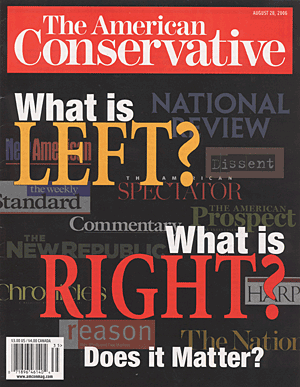Why I Am A Religious Conservative
 Saturday, September 1, 2007 at 07:23PM
Saturday, September 1, 2007 at 07:23PM  The culture in which we live insists on using labels as a shorthand way of communicating ideas. Since labels have become such powerful factors in shaping opinions and attitudes in society, we need to locate ourselves on the spectrum of conservative and liberal terms.
The culture in which we live insists on using labels as a shorthand way of communicating ideas. Since labels have become such powerful factors in shaping opinions and attitudes in society, we need to locate ourselves on the spectrum of conservative and liberal terms.
Conservatives believe in keeping up existing institutions and customs. These beliefs usually lead them to oppose any radical changes. They hold their ideas and values with deep conviction, and fiercely guard against any attempt to change them. Today’s liberal establishment, however, not only advocates openness to change, it actively seeks it. Their quest often translates into a destructive, anti-religious mindset. Indeed, the liberal view now dominates our society. Even the thesaurus of the word processor I am using to write this article refers to synonyms for conservative with mostly negative words: cautious, unprogressive, traditional, unchanging, conventional, inflexible, obstinate, right-wing. Other terms used for conservatives are: old-fashioned, obsolete, out-of-touch and closed-minded.
I reject such negative terms as they are used for conservatives. Conservative Christians can be just as educated, effective, in-touch and influential in the modern setting as liberals. They know how to use state-of-the-art equipment, employ up-to-date methods, and preach a relevant gospel in today’s world. But the most important factor in the Christian conservative position remains the immutable, eternal Word of God. The Bible is forever settled in heaven. It cannot change.
Yet, conservatism need not be a purely visceral reaction to change. While the reactions of some may fit this description, many conservatives deliberately choose to remain or become conservative for well-founded reasons. After examining the evidence from both scriptural and cultural standpoints, they believe that conservatism is the best way to think and live. Here are some of the reasons why I choose to be a conservative.
I believe in absolute truth . The liberal view holds that truth is relative, and that a fact can be either true or false, depending upon the situation. But Jesus said, “I am the … truth.”
I believe in a God who does not change. Most liberals believe that God, if he exists at all, evolves with human culture. As we have changed, they think, so has our definition of God. I cannot reconcile this with the statement of God himself, “I am the Lord, I change not.”
I believe in the infallibility of the Bible. The Bible is verbally inspired, written by men who were unctionized by the Holy Spirit. The Bible forms the basis of civilization.
I believe that compromising convictions is dangerous. Liberals are willing to change anything that appears too restrictive or discriminatory. But tampering with the foundations compromises the integrity of the structure. Trends, whims, opinions and the vacillating wills of people provide poor criteria upon which to engineer a shift of convictions.
I believe that the church is under constant attack. I am not paranoid, but I do believe the scripture which says, “Be sober, be vigilant; because your adversary the devil, as a roaring lion, walketh about, seeking whom he may devour.” (I Peter 5:8) Anything that weakens the church raises a red flag to me.
I believe that we owe a debt to pioneers and forefathers. The brave and hardy souls who led the first wave of the Apostolic movement paid for our heritage with blood, sacrifice and, in some cases, total loss. We owe it to them to maintain the victories that they won and to show great appreciation for the legacy they gave to us.
I believe that rebellion often comes disguised as progressiveness. The world may teach us to do things better, but it will never teach us better things. If a subtle resentment and rebellion against truth underlies a push for change, the result will be disastrous.
I believe that methods may change but the message may not. We have a rock-solid message of doctrinal and spiritual truth to preach. Any method that will improve my mission without altering the message may be acceptable, but some methods can destroy the message. In any case, the message must win out.
Yes, I am a religious conservative. The label of conservative, however, means something only to today’s world. In Apostolic days, we would have just been called Christians.
 ViewPoint
ViewPoint 
Reader Comments (1)
Where does this concept come from?
"The Bible is forever settled in heaven. It cannot change."
The Word is not the Bible! :) The Word is living. The Bible contains a record of some of the utterances of the Word. It is not the Word.
Truth is not owned exclusively by books written 2,000+ years ago. Truth is living. Truth is eternal, and it is revealed freshly in every generation that seeks it. The generations of 2,000+ years ago were not magically endowed with a greater ability to record truth. The Spirit was not greater then, than it is now; inspiration is not dead, nor did it end 2,000 years ago.
It's important to know what early Christians believed, and what Jesus said, and that's what the New Testament gives us. The Bible is not irrelevant, it is highly relevant; however, it is not something to be worshipped as the Word, because it is not that.